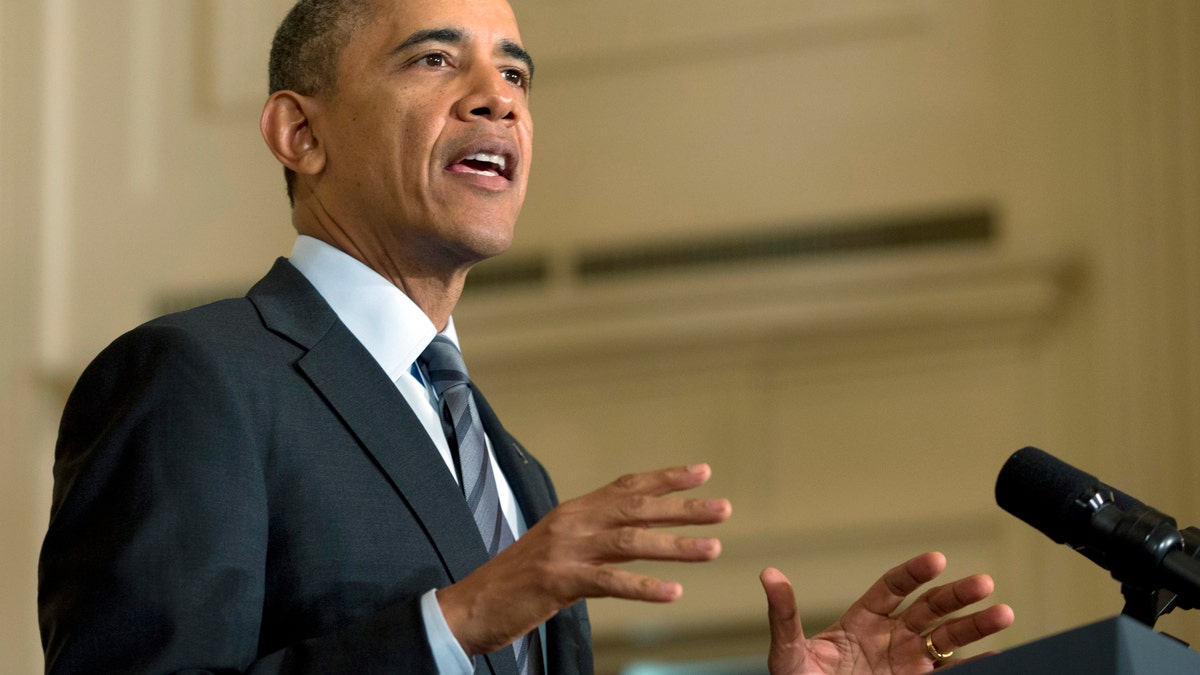
Jan. 31, 2014: President Obama gestures as he speaks in the East Room of the White House. (AP)
Here’s the good news for Peyton Manning: he didn’t get sucked into talking about what a Super Bowl win would mean to his legacy.
He had the good sense to know that performance comes first, legacy follows.
As he said to reporters before the big game, "…I’m not sure you can have a legacy when you are 25 years old, or even 37. I thought you had to be 70 to have a legacy."
That’s news to President Obama.
This president has been obsessed with creating his legacy from an embarrassingly early age; who in the world writes two memoirs before the age of 45?
[pullquote]
Maybe someone who views himself as a historic figure, the kind of person who can slow the rise of the oceans and heal the planet, for instance.
The kind of fellow who invites presidential historians to dine at the White House to make sure he’s on script.
Obama’s ambition and quest for legacy have cost the country dearly, as even liberal economist Alan Blinder admits in a new book, "After the Music Stopped."
In his analysis of the financial crisis and its aftermath, Blinder asks: “Did President Obama overextend himself…and us?” His answer: “an emphatic yes.”
Blinder thinks that because Obama set out to “cauterize the bleeding financial system, to stimulate aggregate demand, to reform financial regulation, to transform healthcare delivery…to devise a new climate/energy policy…to reform America’s K-12 education system, and much else...,” the public tuned out. In Blinder’s words, Americans “could not discern any forest, only lots of trees…” They never figured out what the president really stood for, or what his strategy was.
To be fair, Obama faced a massive economic meltdown when he took office; the stanching of the financial bloodletting was not a matter of choice.
Also, an overhaul of banking regulation was a given; the public wanted to see the financial companies hobbled and demanded new restrictions that would preclude another crisis.
Dodd-Frank will not prevent future bubbles, and the safeguards installed are in some cases absurd.
Still, addressing the financial industry’s role in the meltdown was mandatory.
ObamaCare, on the other hand, was a matter of choice. This was Obama’s big policy breakthrough – something Hillary Clinton, after all, had failed to secure.
Something he had pledged to Ted Kennedy, one of Obama’s earliest and most important backers.
If he could push through universal health care, a cause in which he had shown little interest earlier in his career, he would secure his place in the history books.
Blinder thinks that the administration’s failure to explain the complicated and expensive bank bailouts, and the programs designed to aid overextended homeowners, and the rescue of Detroit automakers – that anger at all these worthy but expensive programs caused the backlash in 2010 that delivered the House to the GOP.
Those policies raised alarms, for sure, but what drove people to the voting booths that November was ObamaCare.
Even at the beginning, Americans knew they were being scammed. They knew you couldn’t provide free health care to 30 million people without someone picking up the rather large tab.
As prescient as voters were, though, they could not foresee the end result of turning one-sixth of the economy upside-down.
No one anticipated that ObamaCare would stop our recovery in its tracks.
That millions would remain out of work five years after the recession ended because small businesses were paralyzed by uncertainty, by not knowing what the cost of hiring would be, because the sand continually shifted under their feet.
That consumer confidence would swoon, and swoon again.
That green shoots would wither and die – not once, but year after year as the rules changed and business owners put off hiring.
This is the real legacy of Barack Obama. It is the increased incursion by the federal government into the private sector, and the worst recovery in the nation’s history.
For sure, rampant automation has played a role in our disappointing employment; struggling companies laid off millions during the downturn and then discovered they could, with new gizmos aplenty, carry on without those employees as business began to revive. But a bigger part of the story is the molasses of ObamaCare poured on the sputtering recovery – the program that gummed up the works in historic fashion.
Blinder reminds us that President Bill Clinton promised to “focus like a laser beam on the economy,” and he argues that “Barack Obama made no such defining declaration. And it hurt him.”
It also hurt the country.
He notes that Obama, early on, decided to be a “transformational president’ and try to do everything at once, leaving the public confused and the administration (and Congress) overburdened.
Blinder excuses some of these errors as the work of a “rookie” president who was naive and in over his head. I think that’s generous.
Even the devoted New York Times (before they became quite so devoted) entitled a 2007 profile of the aspiring politician, “Ambition marked Obama’s early career.”
Little did they know that ambition would become his legacy, as well.








































